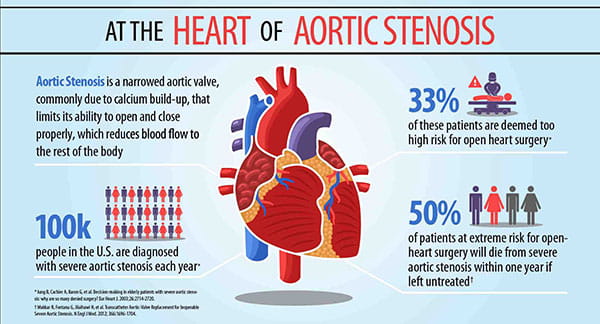Orlando Health Heart & Vascular Institute Offers New FDA Approved Transcatheter Heart Valve Therapy
CoreValve®System is a new option for patients living with aortic valve disease.
MEDIA CONTACT
Sabrina Childress321.841.8748
[email protected]
ORLANDO, Fla. (July 8, 2014) - Doctors at the Orlando Health Heart & Vascular Institute are offering a new minimally invasive system to treat patients with narrowed, failing aortic heart valves who are considered to be at high risk to undergo surgery. Orlando Health is the only hospital in Orlando currently offering the Medtronic CoreValve® System.
“The system means patients with aortic valve disease who are considered high risk for surgery, now have a new option,” said Deepak Vivek, MD, interventional cardiologist and director, Orlando Health Heart & Vascular Institute Valve Center. “Patients no longer have to live with severe chest pain, shortness of breath, fatigue and other symptoms of aortic stenosis, or limited treatment options that may not provide lasting results. Patients no longer have to live without hope for improvement. We are excited to bring advanced technology to improve outcomes for our patients.”
The CoreValve System initially was approved by the U.S. Food and Drug Administration (FDA) in January 2014 to treat patients who are too ill or frail to undergo surgery. With this latest approval, the Orlando Health Heart & Vascular Institute now also offers the CoreValve System to patients who are considered at high risk for a surgical heart procedure, serving a broader range of U.S. patients than any other transcatheter aortic valve.
The FDA approved the CoreValve System to treat patients with severe aortic stenosis who are at high risk for surgery based on groundbreaking research showing the transcatheter heart valve had superior survival rates at one year when compared to open-heart surgery, the current gold standard for aortic valve replacement. The CoreValve System also demonstrated low rates of procedural complications, including stroke, one of the most concerning complications of valve replacement because it can affect survival and quality of life.
The CoreValve System replaces a diseased aortic heart valve through a minimally invasive procedure, without open-heart surgery and without surgical removal of the diseased valve. The device is typically inserted via an artery in the leg or upper chest, and then guided through the arteries into the heart. Once in place, the CoreValve System expands and takes over the original valve’s function to enable oxygen-rich blood to flow efficiently out of the heart.
The advanced design of the CoreValve System is suitable for patients with native valves of nearly all sizes, and it is delivered through the smallest available delivery system, making it possible to treat patients with vascular systems that are small or difficult to navigate. Additionally, the valve’s self-expanding frame enables physicians to deliver the device in a controlled manner, allowing for accurate placement.
Aortic stenosis is a common heart problem caused by a narrowing of the heart’s aortic valve due to excessivecalcium deposited on the valve leaflets. When the valve narrows, it does not open or close properly, making the heart work harder to pump blood throughout the body. Eventually, this causes the heart to weaken and function poorly, which may lead to heart failure and increased risk for sudden cardiac death.

About Orlando Health
Orlando Health is a $3.4 billion not-for-profit healthcare organization with more than 2,400 beds serving Central Florida and beyond. Consisting of eight wholly-owned or affiliated hospitals and rehabilitation centers, Orlando Health has the area’s only Level One Trauma Centers for adults and pediatrics, and is a statutory teaching hospital system that offers both specialty and community hospitals. They are: Orlando Health Orlando Regional Medical Center (ORMC); Orlando Health Arnold Palmer Hospital for Children; Orlando Health Winnie Palmer Hospital for Women & Babies; Orlando Health UF Health Cancer Center; Orlando Health Dr. P. Phillips Hospital; Orlando Health – Health Central Hospital; Orlando Health South Seminole Hospital; Orlando Health South Lake Hospital; affiliate, St. Cloud Regional Medical Center.
The organization includes Orlando Health Medical Group and Orlando Health Physician Associates, two of the region’s largest multi-specialty practices; a renowned cancer center – Orlando Health UF Health Cancer Center (with free-standing sites in downtown Orlando, the Dr. Phillips community in southwest Orlando, Lake Mary, Ocoee and Clermont); four outpatient surgery centers; 10 wholly-owned, affiliated or partnership urgent care centers; and a majority interest in an entity operating five outpatient imaging centers.
More than 2,900 physicians have privileges across the Orlando Health system, which is also one of the area’s largest employers with more than 20,000 employees who support our philosophy of providing high-quality care and service that revolves around patients’ needs. Orlando Health proves this everyday with more than 112,000 inpatient admissions, more than 2.4 million outpatient visits and more than 10,000 international patients each year. Additionally, Orlando Health provides more than $450 million in total value to the community in the form of charity care, community benefit programs and services, community building activities and more.






